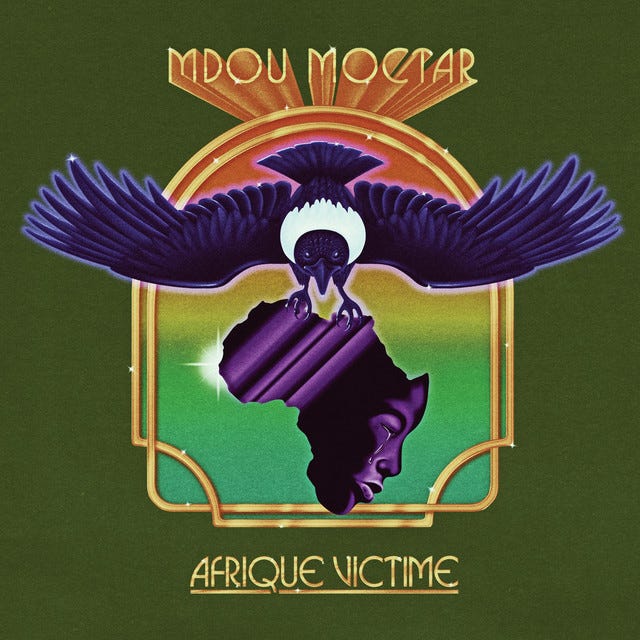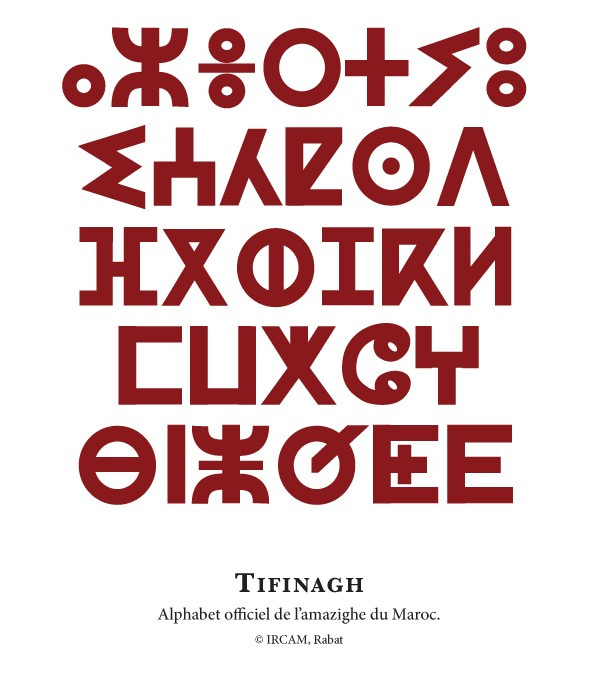Genre of the Day - Tishoumaren
Album of the Day - Afrique victime by Mdou Moctar (2021)
While the African Union has made great strides to bring 54 countries across 11,724,000 square miles together in discussion and intracontinental action, perhaps no intergovernmental instrument has bridged cultures across Africa better than a single musical instrument—the guitar. From Kenya’s dry-guitar omutibo to Zimbabwe’s sungura and the DRC’s kwassa kwassa, time and again in this column we’ve seen how across the continent the guitar has bridged unfettered melodic potential with local rhythms. A litany of traditional lutes (lutany?) served as direct precedents to the guitar, bringing a distinctive sense to instrumentalists’ approach to the ultimate journeyman’s instrument. Today, we hear the sound of the guitar echoing across the slopes of the Sahara.
The Amazigh people are among the many groups worldwide dispersed over such a broad cross-section of nation-states that they do not have one of their own; forming an administrative center in the Sahara would be of supreme difficulty, wider political reasons notwithstanding. Existence in a famously hostile desert does not equate to being out of step with wider musical trends, though. In fact, it stimulated the ingenuity of today’s genre at its inception. Tishoumaren, which translates from Tuareg as guitar, evolved as an iteration of traditional Tuareg folk music in the 1980s, trading out traditional violin and lute for the electric guitar. Though young Tuareg musicians were often taken with imported psychedelic rock and blues records, guitars weren’t readily available. Ibrahim Ag Alhabib, the founder of the acclaimed group Tinariwen, fashioned his first guitar from tin can, a stick, and bicycle brake wire, the supplies most readily available to him as his family escaped conflict in Mali.
As groups formed and put their recordings to cassette tapes, they quickly found success across the Sahara and beyond. Their guitar interpretations conveyed both the supreme endlessness of the desert, its glories and its eternities, as well as the tragedy of war and displacement that has upended the lifestyles of Amazigh peoples. Though their narratives have given desert blues a great deal of international buzz over the years, for many of its artists global recognition pales in comparison to the sense of revitalization and persistence it has lent to the entire Amazigh cultural sphere, embattled for decades from the aftershocks of French colonization and modern economic and social marginalization within independent states. Across the region, music acts as powerful conduits for political protest like the work of Western Saharan singer Aziza Brahim.
Niger’s Mdou Moctar has emerged as a figurehead for 21st century tishoumaren, whose work highlights how extractive neocolonialism still affects Amazigh communities with a continental skew to how music can voice power to pan-African issues. Like seemingly all greats of the genre, he craftily worked around the barriers to accessing a guitar by simply building his own out of bicycle cables and wood and generated exposure across the region via person-to-person MP3 sharing. 2021’s Afrique victime is the seventh full-length chapter in a storied career, and certainly one that drew the most press from the international zeitgeist for its psychedelic and political triumphs. “Chismiten’ pairs high-octane, texturally rich guitar against stop-start rhythms, drawing you towards an unseen edge with each phrasing. The psych riffing of “Taliat” is oriented in upwards, downwards, and spiraling, a manifestation of the search for the esoteric stimulated by, if not ordered by, the foreboding desert. “Tala Tannam” is a gentle love song, though far from inert with its driving rhythm and depth from all angles, cutting into the psyche like the rocks cutting into the ground he sings about. The rapidly building suite “Afrique victime” deftly wields the French imposed upon the region, made francophone Africa’s own by a willingness to turn the knife the other way. It’s a rich, masterfully played declaration of purpose through a lens dusted and enriched by Saharan sand.








A Live recording of Mdou Moctar / J.R.C.G. 6/28/24 @ Union Transfer - Philadelphia now @ #NINA
https://www.ninaprotocol.com/releases/mdou-moctar-j-r-c-g-6-28-24-union-transfer-philadelphia